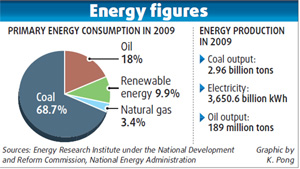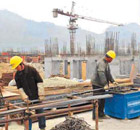Government and Policy
Wen heads 'super ministry' for energy
By Wan Zhihong (China Daily)
Updated: 2010-01-28 07:10
 |
Large Medium Small |
Commission oversees planning, security, international cooperation
An overarching government agency has been set up to take charge of the country's energy policy for better coordination in formulating strategy and planning development.
Premier Wen Jiabao will head the agency, called the National Energy Commission (NEC), and Vice-Premier Li Keqiang will be the deputy, the State Council, or the Cabinet, announced yesterday.
The NEC has 21 members, including ministers from various organizations such as the National Development and Reform Commission (NDRC), and the Ministry of Finance, as well as a representative from the central bank.
Industry insiders said the move means energy has been identified as key to the future development of the country, which is now the world's second-largest energy consumer.
"The establishment of the NEC shows the government has raised energy issues to an unprecedented level," said Lin Boqiang, director of the China Center for Energy Economics Research at Xiamen University. "Such a super ministry, which centralizes the powers of different ministries, can help China make better use of its energy resources."
Energy has become a complex issue and cannot be managed by one single ministry, said Lin, citing domestic energy companies' overseas development as an example.
Chinese oil companies have stepped up their overseas profile in recent years but the issue has to be dealt with by different ministries such as the NDRC and foreign affairs.
"We need to pool all our efforts to achieve sustainable development in the energy sector," he said.
Lin' views were echoed by Zhang Jianyu, China program manager of the US Environmental Defense Fund, who said energy will be the top priority in China's future strategies.
"The establishment of the NEC will provide a better mechanism for China's energy sector, optimizing the country's energy portfolio as well as coordinating supply and demand," said Zhang.
The government last year set a hefty target of reducing the intensity of carbon dioxide emissions per unit of GDP by 2020 by 40 to 45 percent from the 2005 levels; and Zhang said the NEC could coordinate with different ministries to exchange ideas and expertise to achieve the target.
"Some analysts say the 45 percent plan is ambitious, and some even think it could be a constraint on economic development. But I believe with the NEC, we can turn the target into a new opportunity for the economy," he said.

The setting up of the NEC is part of continuous efforts in administrative reform, which are aimed at orienting various functions of different departments toward higher efficiency, said analysts.
A Ministry of Energy was established in 1988 but it was disbanded five years later because its administrative functions overlapped with other departments.
Facing increasing energy shortages, the government set up an Energy Bureau under the NDRC during administrative reforms in 2003.
The National Energy Administration (NEA) was set up in 2008 but it lacks the power to carry out many of its assigned tasks as responsibility for the energy sector is currently spread among a number of departments.
For instance, prices of petroleum products and electricity are still decided by the NDRC.











